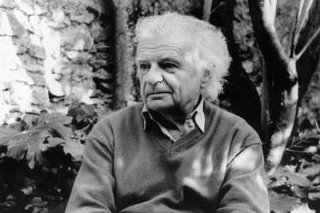So the Prix Goncourt (more or less the French equivalent of the Pulitzer Prize and the Man Booker Prize, although it is awarded only to novels) was awarded to Jonathan Littell for Les bienveillantes (whose American rights were recently bought, I believe by Vintage/Random House, under the title The Kindly Ones). The nomination had caused a furore a couple of weeks ago, notably on Pierre Assouline's blog for its naive approach to the Nazi occupation, but also probably because Littell is an English speaking novelist writing in France while living in Spain.
And happy birthday to Jessica.
***
But more interestingly, this little note on the state of contemporary French poetry, roughly and crudely translated by moi (also from Le Monde)To Think As Poet
Le Monde – 11/02/06
Does poetry still have a future? Or is it now only a thing of the past, just good enough to be an object of scholarly study? Indeed, it seems to be proliferating today, as it should in an era where the multitude appropriate more and more many kinds of artistic practices, well beyond the simple hobby. But poetry’s symbolic value has to this point so eroded itself that some have mentioned, not without reason, its “obsolescence” (William Marx in his very suggestive essay Farewell to Literature published last year by the Editions de Minuit).
Under a form however, poetry still seems to be prosper (a little). Doesn’t it play indeed, even meagerly, its partition in concerts with the arts of the stage and of spectacle? “Performance poetry,” poetry set to voice, accompanied by music, video or dance, is without doubt popular. As such, some do not hesitate to speak of a “golden age,” while they wonder if poetry still belongs to literature. Such is the case of Jean-Michel Espitallier, in a recent essay, alert and stimulating (Toolbox, a Panorama of Poetry Today, Pocket). Considering the diversity of poetry’s media (“sound, concrete, visual, numeric, non-textual, video, performance, etc. poetry) underlining the importance of the “transversality” of artistic practices, he thus believes to be able to assert that poetry “seems to be outside of the strictly literary space.”
Because the exposition, the staging and the directing are in a way co-substantial, this “non-literary” side of poetic production is obviously today the most visible. The problem is that poetry involved in the “cultural” (to quote Michel Deguy) tends to mask a less “spectacular” aspect, where the poet is first a writer rather than a “performing artist”; where poetic writing continues to belong to a literary space that includes not only the novel or the essay, but also philosophic writing itself.
Because, coupled with philosophy, poetry continues to feed on its connection to itself. The dynamic of its modern revolutions is not foreign to new configurations of this coupling, to their connection as prosodic as “thinking” (think of Hölderlin or of Leopardi, notably). In France, works as important as Yves Bonnefoy’s, Philippe Jaccottet’s, Michel Deguy’s or Dominique Fourcade’s pursue this tradition, showing today, each in their own fashion, fruits that can result from this complicity between a poetry and a philosophy that refuse to lose touch.
That “thinking poetry” is still relevant, that it is a “future phenomenon” and a denial to the “death of poetry” is what is still asserted, in the younger generation, by the work of a poet like Philippe Beck. Defender of verse, he is also that of abandoned forms (the didactic poem), where the poet he is also reveals himself - against an “anti-philosophy of the (poetic) scene” he denies – as a philosopher. Singular philosopher, without a doubt, but aren’t here many ways to practice philosophie?
To define it “as the art of being a poet,” as Beck does, implies a lot, without doubt, about philosophy itself and about its definition. But it is first a big (and fecund) consequence for poetry, for its reinvention in the logical as well as musical order of thought. A book of interviews with Gérard Tessier that the author has just published (Beck, the non-character, Argol, 250 p., 25 euros) brings through a prose as astonishing as it is vivifying, a beautiful demonstration. Philippe Beck is not satisfied with just a reflection on his practice of poetic writing, his connection to language and languages. Like his collections of poetry, his meditaions as poet-philosopher does not exclude anything, submitting to a rhythmic thought all kinds of objects, such as childhood, family, the self, music or even the times and his prose, his perception, analogy, residence, democracy, etc. On all those topics, Philippe Beck develops views that are notable for their density and their penetration, their novelty, the power to launch the rockets of thought. And if those exchanges strike so vividly, so superbly, common sense (including that of philosophy) from its torpor, it is because this meditation is singing with a rare prosody, where one always here “the physical song of sense.”
The “non-disparition of poetry,” Philippe Beck reminds us, comes from the “need to hear a musical discourse,” of which “man cannot live without,” because only its discourse (poetry’s) “weds the feeling and the calculus of sense.” If poetry is still a future phenomenon, it is not (or not only) because it would be able of sliding among the performing arts, it is because it is as much philosophy as music – art of the senses and not only just art. The future of poetry is thus not dissociable of this possible principle that sees it – it is here his inopportune actuality – be a form of philosophie; be, always, a “thinking poetry.”
Jean-Claude Pinson
***
And happy birthday to Jessica.

Comments